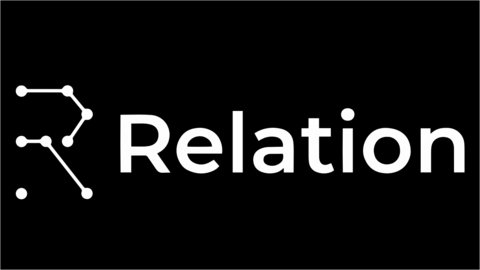Relation Therapeutics, the Active-Graph Machine Learning Drug Discovery Company, Names David Roblin as CEO and Lindsay Edwards as CTO
Relation Therapeutics, the Active-Graph Machine Learning Drug Discovery Company, Names David Roblin as CEO and Lindsay Edwards as CTO
DCVC and Magnetic Ventures co-led a $25 million seed financing, with participation from Khosla Ventures, OMERS Ventures, and firstminute Capital, among others
LONDON--(BUSINESS WIRE)--Relation Therapeutics, the pioneer of drug discovery using active-graph machine learning (ML) combined with single-cell analysis and deep clinical insights, announced today that it had raised a $25 million investment and hired a Chief Executive Officer and Chief Technology Officer. The funding and expanded leadership will enable Relation to scale its platform and advance therapeutic candidates for diseases with no or few good medicines.
Dr. David Roblin joins the company as Chief Executive Officer and Dr. Lindsay Edwards as Chief Technology Officer and President of Platform. “We will dramatically improve success in drug discovery—we must, because patients are waiting for breakthrough medicines,” said Roblin. “Our approach brings together, for the first time, human genetics, single-cell omics, functional genomics, and active-graph machine learning in a single, engineered design. We believe our techniques will significantly accelerate the discovery of new, life-changing drugs.”
The critical bottleneck in drug discovery remains the poor understanding of the biology underlying disease. As a result, we don’t know why patients become sick; and far too often most drug candidates fail in trials and many devastating diseases remain untreated. Historically, successful drugs have mostly been discovered by sheer luck. Relation delivers a radically different approach that can better understand the biology of disease and rationally discover new therapeutics.
Relation’s platform uses the power of active-graph ML, called Metagraph. The technology has been successfully employed by technology companies to solve problems in computer vision and product recommendations, but never before in drug discovery at this scale. With active-graph machine learning, Relation can understand the huge number of combinatorial functional relationships between genes, proteins, and drugs. Relation will be piloting part of this work with NVIDIA, as one of only four startups to have access to the NVIDIA Cambridge-1 GPU supercomputer.
Relation’s pioneering “lab-in-the-loop” integrates active learning at every step of drug discovery, from predicting cell states to the validation of new targets. An important challenge for any therapeutics company using machine learning is “ground-truth data,” or information known to be true. Working from real cells provided by proprietary biobanks, Relation’s technology generates genomic data that provide direct insights into critical biological relationships that are fed directly into its ML systems. The platform then automatically requests new experiments to improve its predictive ability, cutting through an otherwise intractable combinatorial space.
Relation is focusing initially on bone diseases, where there is a pressing unmet medical need, and because the company’s platform has a clear advantage where there exist good cellular representations. “Relation brings a powerful, proven approach to interrogating extremely complex information to efficiently make high-quality recommendations. The speed at which they operate and the progress they’ve made are remarkable and may be transformative. We’re thrilled to join them in their efforts,” said Jason Pontin, a DCVC Partner and Relation board member.
Christine Aylward, Founder & Managing Partner of Magnetic Ventures and a member of Relation’s board, commented, “Beyond its groundbreaking platform technology, Relation’s team has demonstrated its ability to form partnerships and attract an interdisciplinary set of global leaders across machine learning, single-cell genomics, and drug discovery. We are delighted to partner with Relation and the investor syndicate to support the company’s vision of transforming drug discovery with its novel approach.”
Dr. David Roblin is a distinguished scientist, physician, entrepreneur, and life-sciences industry executive. Roblin has been involved in Relation since its founding, while engaged as CEO of Juvenescence Therapeutics, an early investor in Relation. Before joining Relation, he was Chair of Scientific Translation at the Francis Crick Institute, where during his eight-year tenure, he held several executive positions. Earlier, Dr. Roblin was SVP and Head of European R&D for Pfizer. He is also a Non-Executive Director of Sosei Heptares (SOLTF) and Non-Executive Chair of Centauri Therapeutics.
Dr. Lindsay Edwards was previously Vice President and Head of Artificial Intelligence for Respiratory and Immunology at AstraZeneca, where he built a world class machine learning function. Earlier, he founded and led one of GSK’s first data science groups and served as Vice President and Head of Artificial Intelligence/Machine Learning for the UK and Europe.
Relation’s scientific advisory board includes luminaries from a broad range of disciplines, including Professor Michael Bronstein, DeepMind Professor of AI at Oxford University and Head of Graph AI at Twitter; Professor Caroline Uhler, core institute member and co-director of the Eric & Wendy Schmidt Center at the Broad Institute and Associate Professor at MIT; and Professor Alex K. Shalek, institute member at the Broad Institute and Associate Professor at MIT. Relation has a history of collaboration and co-publishing with Turing Award Winner Professor Yoshua Bengio of the Montreal Institute for Learning Algorithms (Mila) on the application of the active learning algorithms.
In addition to DCVC and Magnetic Ventures, the seed financing also included participation from Khosla Ventures, OMERS Ventures, and firstminute Capital, Peer Schatz, the former CEO of Qiagen (NYSE:QGEN), Jonathan Milner, founder of Abcam (LSE:ABC), and Mark Stevenson, former COO of ThermoFisher (NYSE:TMO).
About Relation
Relation discovers new biology to cure disease faster, transforming the traditional R&D model: because patients are waiting. Integral to this, Relation combines the power of active-graph machine learning and large-scale, high-quality data that describes disease biology to find better ways of targeting human pathology. We generate proprietary maps of disease in humans, leveraging human genetics, single-cell omics and perturbational data, so that these powerful models can be deployed at last. Relation’s platform sits in an integrated wet-lab, dry-lab, translational science loop, located in London.
Contacts
Media:
Michael Lampe
michael@scientpr.com
